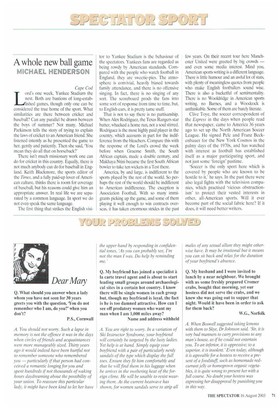A whole new ball game
MICHAEL HENDERSON
Cape Cod
Lord's one week, Yankee Stadium the next. Both are bastions of long-estabished games, though only one can be considered the true home of the sport. What similarities are there between cricket and baseball? Can any parallel be drawn between the boys of summer? Not many. Michael Parkinson tells the story of trying to explain the laws of cricket to an American friend, She listened intently as he presented the game to her, gently and patiently. Then she said, 'You mean they do all that on horseback?'
There isn't much missionary work one can do for cricket in this country. Equally, there is not much anybody can do for baseball in England. Keith Blackmore, the sports editor of the Times, and a fully paid-up lover of American culture, thinks there is room for coverage of baseball, but his reasons could give him an appropriate answer. In real life we are separated by a common language. In sport we do not even speak the same language.
The first thing that strikes the English visi
tor to Yankee Stadium is the behaviour of the spectators. Yankees fans are regarded as being rowdy by American standards. Compared with the people who watch football in England, they are sweetie-pies. The atmosphere is convivial, heavily biased towards family attendance, and there is no offensive singing. In fact, there is no singing of any sort. The scoreboard prods the fans into some sort of response from time to time, but. to English ears, it is pretty tame stuff.
That is not to say there is no partisanship. When Alex Rodriguez, the Texas Rangers star batter, whacked a home run, not a soul stirred. Rodriguez is the most highly paid player in the country, which accounts in part for the indifference from the bleachers. Compare this with the response of the Lord's crowd the week before when Graeme Smith, the South African captain, made a double century, and Makhaya Ntini became the first South African bowler to take ten wickets in a Test there.
America, by and large, is indifferent to the sports played by the rest of the world. So perhaps the rest of the world should be indifferent to American indifference. The exception is Association Football. With so many immigrants picking up the game, and some of them playing it well enough to win contracts overseas, it has taken enormous strides in the past few years. On their recent tour here Manchester United were greeted by big crowds — and even some media interest. Mind you, American sports writing is a different language. There is little humour and an awful lot of stats, with plenty of meaningless quotes from people who make English footballers sound wise. There is also a bucketful of sentimentality. There is no Wooldridge in American sports writing, no Barnes, and a Woodcock is unthinkable, Some of them are barely literate_ Clive Toye, the soccer correspondent of the Express in the days when people read that newspaper, came to America 36 years ago to set up the North American Soccer League. He signed Pele and Franz Beckenbauer for the New York Cosmos in the palmy days of the 1970s, and has watched with interest as football has established itself as a major participating sport, and not just some 'foreign' pastime.
'Soccer is the only sport here which is covered by people who are known to be hostile to it,' he says. In the past there were also legal fights with the television companies, which practised 'vicious obstructionism' to protect their vested interests in other, all-American sports. Will it ever become part of the social fabric here? If it does, it will need better writers.










































































 Previous page
Previous page